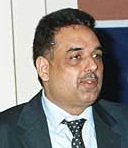
Hon’ble Shri. Pramod Kumar, Accountant Member, Kolkata Bench, delivered a presentation on “Substance vs. Form – Judicial Perspective” at a seminar organized by Foundation for International Taxation on 6th to 8th December 2012. In the presentation, the Hon’ble Member has explained how the controversy over whether form should prevail over substance has evolved and how Courts have dealt with the controversy. The issue has been explained in the backdrop of the judgements of the Supreme Court in McDowell & Co Ltd 154 ITR 148, Azadi Bachao Andolan 263 ITR 706 & Vodafone International 341 ITR 1.
In particular, the Hon’ble Member has explained in what circumstances Courts are inclined to apply substance over form and what type of transactions are at risk.
The presentation will prove to be very useful to all tax professionals.
The other eminent speakers at the seminar included Ex Chief Justice S. H. Kapadia
 Power Point Presentation of Hon'ble Shri. Pramod Kumar (116.2 KiB, 3,493 hits)
Power Point Presentation of Hon'ble Shri. Pramod Kumar (116.2 KiB, 3,493 hits)
See the Video of the presentation at thefirm.moneycontrol.com. See also Chief Justice Kapadia’s presentation
The two videotaped experts’ presentations, albeit on a hotly debated topic of controversy, marked by strongest emotions of its kind, in recent years, namely, – Form v Substance, are worth an astute listening.
Ex Chief Justice S. H. Kapadia (SHK), for reason he frankly admitted, chose to deal with the same topic but wrt the law on ‘transfer pricing’ as embodied in section 93 and allied sections, of the I T Act, instead of wrt the issues in Vodafone case raised under the scheme of the basic provisions of sections 4, 5, and 9. As SHK lucidly underlined, unlike in I T cases in which it is textual interpretation which comes into play, in cases coming up for adjudication under the constitutional law court is required to resort to a much wider interpretation laying emphasis on the facet of ‘common good’.
The term ‘common good’, in this context, in one’s perception , has to be taken to mean and used interchangeably with the other term commonly come across ; that is,- ‘public interest’. SHK also referred to the other connected area of controversy, – that is centred on the concept of ‘territorial jurisdiction’.
That irresistibly reminds one what he wrote IN ,- “Tax Treaties- Nuances of Case Law”-(2007) 295 ITR (J) pg 17, 31 and 32; so reproduced for ready reference:
Q
To Conclude:
It is a settled proposition that any member of the public has a right to bring before the court a “public interest “ case, provided he has a “sufficient interest” in the proceedings, and is not a wayfarer, interloper, officious intervener or busy body.
In the words of Krishna Iyer.J, speaking for the apex court in Fertilizer Corporation Kamgar Union’s case (A.I.R. 1981 S.C. 344):
“If a citizen is no more than a wayfarer or officious intervener without any interest or concern beyond what belongs to anyone of the 660 million people of this country, the door of the Court will not be ajar for him. But if he belongs to an organization which has special interest in the subject matter, if he has some concern deeper than that of a busy body, he cannot be told off at the gates, although whether the issue raised by him is justiciable may still remain to be considered.”
Undoubtedly, in the context of today’s India, for applying/following the underlying proposition in the apex court’s quoted observations, would require to be substituted, in place of the population figure of 660 million, a figure of around 1.2 billion.
More importantly, in respect of a dispute of the same or similar kind as in Andolan’s case, it appears that, the crying need of the hour is that our constitutional experts and jurists must address themselves to two important posers:
Is it not eminently desirable to keep in view the cross border implications it entails, so as to proceed with circumspection?
Should not the concept of “public interest” be considered to mean and take within its ambit, also the interests of the public of the other treaty country, not only the Indian public?
In the interests of our nation’s legal / judicial system, is one not justified in expecting them to do so and also come to appropriate conclusions?
UQ
In the nature of things, though, it is, perhaps, too soon to expect and come to know about such conclusions from our judiciary, if not from the government or legislature.
Sir,
Really very nice presentation on the topic “Substance over Form”. It is really a tremendous task to give a presentation in summarised way. It will be of great help to me and also to the profession. I salute Hon. Accountant Member Sri Pramod Kumar Ji for helping us on the topic.
An excellant presentation by a painstaking member.
sir our kudos.
warm regards,
Srinivasan.Pune.